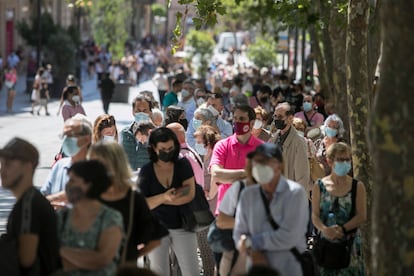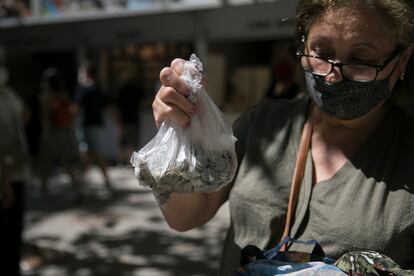Spaniards brave long lines under the sun as deadline finally arrives to exchange pesetas for euros
Thousands of citizens waited right until the last minute on Wednesday to hand over their coins and banknotes to the Bank of Spain. The currency ceased to be legal tender in 2002


Felip Orga, 19, appears to know by heart exactly which peseta coins will be accepted by the Bank of Spain. “The ones that were in circulation in January 2002, the date when the euro came into force,” he is heard explaining to the mostly older people who are approaching him with questions outside the central lender’s branch in Barcelona’s Plaza Cataluña. Across Spain, hundreds of citizens have been waiting in lines of up to three hours this week to exchange the former currency, which ceased to be legal tender in March 2002, into euros. Wednesday marked the last day that members of the public could exchange the banknotes and coins, which have been stashed away in people’s homes for years. But knowing which ones are valid and which are not is no easy task – the peseta has 140 years of history and was minted in various forms during a number of different historical periods. Bank employees in Barcelona were handing out photocopies with illustrations of the tender that could still be swapped, and those that couldn’t – i.e. the notes and coins that ceased to circulate in 1997.
“This kid is very smart,” says Jeni Rosines about Orga. They met on Tuesday morning in the “peseta lines,” as the queues have been dubbed, in the Portal de l’Àngel avenue in the Catalan capital. To give even more weight to her comment, she explains that she was an accountant at the school where he studied. The hours that they spent together in the line gave rise to a number of anecdotes. Orga was carrying two plastic bags in her hand. In one she had pesetas given to her by her father, and in the other, a gift from a stranger. The man had seen the 150-meter line that had formed outside the bank first thing, and decided to give the money away rather than wait under the beating sun for at least two hours.
The Bank of Spain estimates that there are still €1.5 billion worth of pesetas out there that have not been exchanged
Rosines, 50, found out via a TV news report that the June 30 deadline to exchange pesetas for euros was fast approaching. “I spent three days searching the house,” she explains. “I’ve found the equivalent of a week’s work as a waitress. Given that I’m unemployed, it’s very handy.”
She and others in the line complained that they had to spend so much time standing waiting given that there were no free slots via the appointment system. The Bank of Spain has not offered figures for how many people have come to exchange their money since June 23, the first date the central lender restarted face-to-face service since coronavirus restrictions were put in place. Its communication department did, however, confirm that there were lines outside its 15 branches. The banking supervisor estimates that there are still €1.5 billion worth of pesetas out there that have not been exchanged.

The official deadline for handing over the old currency to the Bank of Spain was in fact December 31, 2020, but the central government extended the date given the months of restrictions in place during the pandemic.
But for Mari Àngels Mir the lockdown actually allowed her to root out all of the money that she had forgotten about. “As I spent so many months locked inside, I started to tidy up the house and I found all of this,” she explains, showing a bag in which she calculates there could be as much as 10,000 pesetas – roughly €60. Mir, 78, is planning to give what she has found to her three grandchildren. Her grandmotherly love saw her get up early to take a two-hour train and bus ride, from Girona where she lives, to Barcelona to carry out the task.
Wads of banknotes
Many in the line explain that the money has come from inheritances, and that they had not been able to exchange it previously due to the pandemic. That was the case of Bienvenida Villar, who showed off a wad of old banknotes that had been left to her by an aunt who passed away.
Jordi Giner attracted the most attention. He was carrying two cases that combined weighed about the same as a grown man. Giner calculated that there could be the equivalent of more than €10,000 inside. “I had [the coins] in piggy banks and I only just broke them open,” he explains with a chuckle. He says he is planning to spend the money on meals in fancy restaurants, and perhaps invite a few female friends along to accompany him.
The Bank of Spain, meanwhile, has also warned that the Spanish Tax Office and the Sepblac anti-money laundering unit will be notified of any exchange valued at more than €3,000. That also includes pesetas – no matter what year they date from.
English version by Simon Hunter.
Tu suscripción se está usando en otro dispositivo
¿Quieres añadir otro usuario a tu suscripción?
Si continúas leyendo en este dispositivo, no se podrá leer en el otro.
FlechaTu suscripción se está usando en otro dispositivo y solo puedes acceder a EL PAÍS desde un dispositivo a la vez.
Si quieres compartir tu cuenta, cambia tu suscripción a la modalidad Premium, así podrás añadir otro usuario. Cada uno accederá con su propia cuenta de email, lo que os permitirá personalizar vuestra experiencia en EL PAÍS.
¿Tienes una suscripción de empresa? Accede aquí para contratar más cuentas.
En el caso de no saber quién está usando tu cuenta, te recomendamos cambiar tu contraseña aquí.
Si decides continuar compartiendo tu cuenta, este mensaje se mostrará en tu dispositivo y en el de la otra persona que está usando tu cuenta de forma indefinida, afectando a tu experiencia de lectura. Puedes consultar aquí los términos y condiciones de la suscripción digital.








































